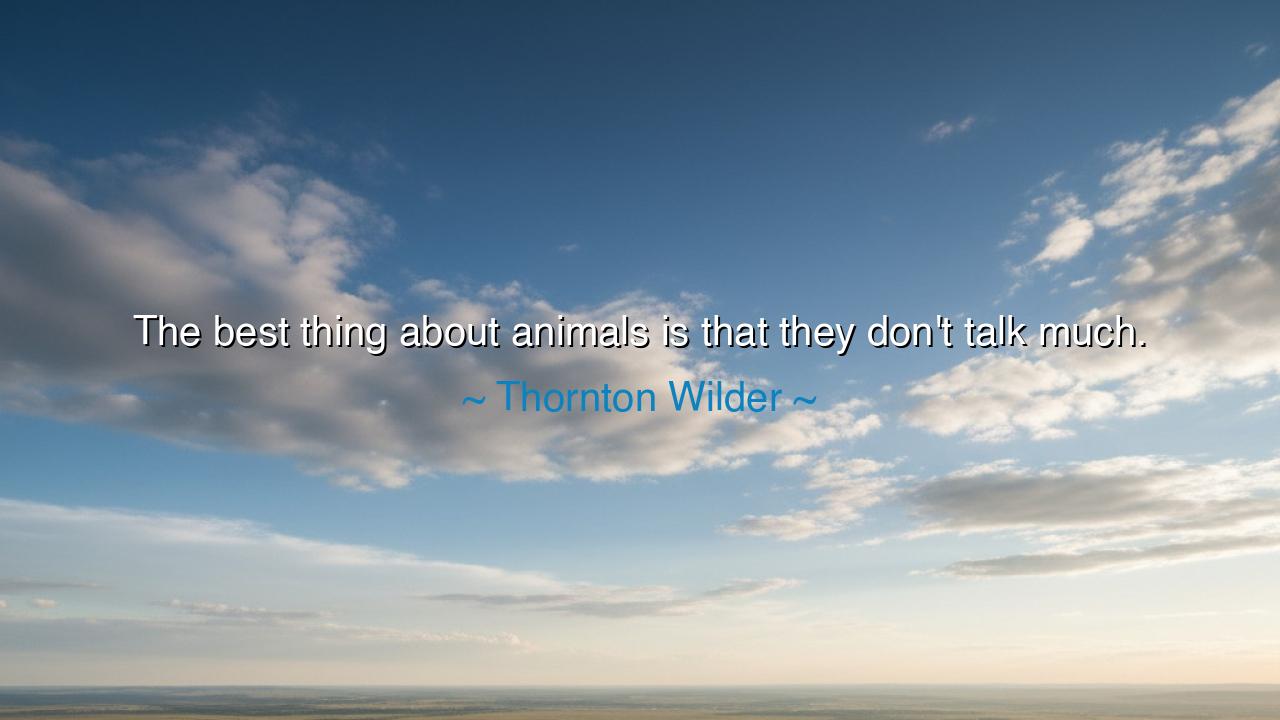
The best thing about animals is that they don't talk much.






Host: The farmyard was drenched in the amber quiet of late afternoon — the kind of silence that only exists where time itself moves slower. Sunlight pooled over the long grass, and in the distance, the soft sound of cows lowing, birds chattering, and wind through hay became the only language worth listening to.
A barn door creaked open. Dust motes danced in the beam of light that spilled across the floor.
Jack stepped out, wearing an old flannel shirt rolled at the sleeves, hands calloused, boots muddy. His grey eyes were softer here — less like steel, more like worn river stone.
On the fence sat Jeeny, her legs swinging lazily, the brim of her straw hat tilted low over her eyes. Beside her, a dog — a mutt with a patient gaze — rested its head on her lap, utterly still, utterly content.
The moment was slow, almost cinematic — nature and humanity briefly at peace.
Jeeny: (gently, as if breaking the spell) “Thornton Wilder once said — ‘The best thing about animals is that they don’t talk much.’”
Jack: (smiling faintly) “Maybe that’s why they seem smarter than us.”
Jeeny: “You mean quieter.”
Jack: “Same thing.”
Host: A bird swooped low, cutting through the golden light. The dog’s ears twitched but it didn’t move — just blinked, slow and deliberate, as if agreeing with them.
Jeeny: “You ever notice how animals just… exist? They don’t chase meaning. They don’t need applause. They just breathe and belong.”
Jack: “Yeah, but that’s because they don’t have to deal with people.”
Jeeny: “Maybe that’s why they’re not broken.”
Jack: (chuckling) “You think silence fixes the soul?”
Jeeny: “I think listening does. And they’ve mastered it.”
Host: The camera drifted across the field — the rhythm of wind in the tall grass, the slow turn of a horse’s head, the flutter of wings across sunlight. Every motion felt deliberate. Unrushed. Whole.
Jack: “You know, Wilder might’ve meant it as a joke. But there’s truth in it. Humans talk themselves into misery. Politics, promises, philosophies — all words, all noise.”
Jeeny: “That’s because words are how we hide from silence.”
Jack: “You sound like one of those zen poets who thinks enlightenment smells like hay.”
Jeeny: (grinning) “Maybe it does. Maybe simplicity isn’t the absence of depth, just the absence of pretense.”
Jack: “So you’re saying the cow over there’s wiser than me?”
Jeeny: “If wisdom’s peace, then yes.”
Host: Jack laughed — a low, genuine laugh that carried across the still air. The dog lifted its head briefly, wagged its tail once, then settled again.
Jack: “You ever wish you could just live like that? No drama, no doubt. Just instinct and sun.”
Jeeny: “Every day. But we’re cursed with awareness. The gift that keeps us restless.”
Jack: “And maybe talking’s how we survive it.”
Jeeny: “Or how we keep avoiding it.”
Host: The light softened, dipping toward the horizon, turning the barn’s shadow long across the field. Somewhere, a rooster crowed late — confused, but confident.
Jack: “You think animals ever think about us?”
Jeeny: “All the time. But not in words. Just… feelings. Like how a dog knows when you’re broken before you do.”
Jack: “You ever wonder how they do that?”
Jeeny: “Because they listen with their whole being. No filter, no ego. Just presence.”
Host: The wind picked up again, rustling through the dry corn stalks nearby. A single feather drifted past, catching the sunset before falling out of sight.
Jack: “You know, maybe we talk so much because silence reminds us we’re small.”
Jeeny: “And animals don’t need to prove they matter. They just do.”
Jack: “So maybe they don’t talk much because they’re not trying to convince themselves of anything.”
Jeeny: “Exactly. Every word we say is an attempt to feel certain. But life doesn’t need explanation — it needs attention.”
Host: Her voice softened as she spoke, blending into the evening hum of the world around them. The camera focused on her hand stroking the dog’s fur — slow, thoughtful, grounding.
Jack: “You think silence could ever replace words?”
Jeeny: “Not replace — reveal. Words build walls. Silence shows what’s behind them.”
Jack: “And what’s behind mine?”
Jeeny: “Someone who’s tired of noise but afraid of stillness.”
Host: He looked at her — really looked — and for a long moment, said nothing. The sun had dropped lower now, setting the horizon on fire. The farm glowed in copper and amber, and in that light, they seemed almost carved from the same quiet earth.
Jack: (softly) “Maybe that’s what faith really is — learning to sit still with yourself long enough to hear something real.”
Jeeny: “Or someone real.”
Jack: “Like you?”
Jeeny: “Like anything that listens back.”
Host: The camera pulled back slowly, revealing the wide expanse of the field — the barn, the fence, the quiet figures, the animals grazing unbothered by the weight of human thought. The world felt vast, but not empty — filled instead with the kind of peace that words can’t touch.
And as the scene faded into twilight, Thornton Wilder’s simple truth lingered, expanding like a whisper into eternity:
That speech is the echo of thought,
but silence is the voice of understanding.
That animals, in their quiet,
teach us what humans forget —
that the heart communicates best
when the mouth rests.
And that perhaps the wisest beings
on this trembling planet
are the ones who simply live,
simply breathe,
and simply listen.
For where words end,
the soul finally begins to speak.






AAdministratorAdministrator
Welcome, honored guests. Please leave a comment, we will respond soon